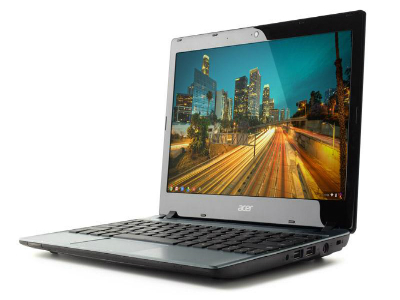Acer Sees More Success in Chrome OS Than in Windows 8
Acer is having more success with Chrome OS in the last two months than it has had with Windows 8 since its October debut.
After suffering two consecutive annual losses, Taiwanese computer maker Acer Inc is now seeing strong sales in its notebook business thanks to Google's Chrome platform. These models accounted for between 5- and 10-percent of the company's U.S.-based shipments since launch in November. Windows 8, on the other hand, has thus far proved to be unsuccessful, the company said.
"The whole market didn’t come back to growth after the Windows 8 launch, that’s a simple way to judge if it is successful or not," said President Jim Wong in an interview.
Like many other computer makers, Acer is looking to find alternative avenues of revenue as consumers flock to smartphones and tablets instead of desktops and laptops. Last week the company announced a NT$3.5 billion ($120 million) write-off on the value of its Gateway, Packard Bell and eMachines brands that pushed it into losses. On a global scale, shipments in the computer industry have dropped 6.4-percent in the fourth quarter despite the launch of Windows 8.
But Chrome is proving to be a highly competitive rival to Windows 8. Google's OS is completely license-free, allowing OEMs to sell machines at a lower cost. Meanwhile Microsoft is struggling to convince customers to switch over to the new Windows platform, but in the process has seemingly scared them with the new Modern UI interface. Had Microsoft put more emphasis on the underlying system instead of the blocky, new touch-friendly overlay, Acer might have been singing a different tune.
According to Wong, Chrome's value is actually more secure than Windows 8. Those who have already adopted Chrome OS are professionals and heavy internet users at educational institutions. Corporations are likely to show more of an interest as Google's OS becomes more popular. He also pointed to Chrome's popularity despite Google's lack of a heavy promotional push.
"You saw that all the marketing and promotions were not as broad as Windows 8, so to reach this success is encouraging," Wong said. He added that Acer had to spend more money on marketing and promotions, offsetting the cost savings of using a license-free OS.
Wong also dismissed plans for making Windows RT devices before the 2013 back-to-school season. He said that while the company is still evaluating the platform, Acer plans to focus on building up its smartphone business. Acer is looking to sell 1.5 million units in 2013, up from 500,000 units in 2012, to 5 million in 2014.
Get Tom's Hardware's best news and in-depth reviews, straight to your inbox.

Kevin Parrish has over a decade of experience as a writer, editor, and product tester. His work focused on computer hardware, networking equipment, smartphones, tablets, gaming consoles, and other internet-connected devices. His work has appeared in Tom's Hardware, Tom's Guide, Maximum PC, Digital Trends, Android Authority, How-To Geek, Lifewire, and others.
-
ethanolson Look, I get why people bag on Windows 8 but it's still way better than Chrome OS. Just sayin'.Reply -
A Bad Day disolitudeLooks like Acer would like to keep selling cheap netbooks.Reply
Nothing wrong with it if they can make a profit off of it. -
disolitude A Bad DayNothing wrong with it if they can make a profit off of it.Notice how mr. Acer doesn't say anything about profit...Reply -
iniudan ethanolsonLook, I get why people bag on Windows 8 but it's still way better than Chrome OS. Just sayin'.Reply
Chrome OS, has it use and for user who are just looking for a cheap computer for basic task. Chrome OS will have better performance then Windows on similar hardware and much lesser hard drive foot print (ChromeOS take like 2GB, Windows 20GB), thus can easily put in a small capacity mSata SSD, and still having some usable storage and helping keeping the form factor of the laptop small, while still been cheap. -
Well, it is obvious that a segment of users are finding their needs better served by smartphones and tablets, and therefore stop buying PCs. As PCs used to serve this segment as well so the switch is reducing the total market volume. Acer is just not able to make any significant in-road as far as the smartphones and tablets are concerns, and hence seeing their profit shrink. PC market volume will shrink and then stabilize at a new level, it will never disappear completely.Reply
It is sort of like when everyone is eating french fries in the past and then suddenly someone introduces pizza, and then you see some people start eating pizzas and the total market volume of french fries start going down. But will everyone merely eat pizzas at the end? Not going to happen.
-
mman74 disolitudeLooks like Acer would like to keep selling cheap netbooks.Reply
Consumers make the decision. There is nothing wrong with Chrome as an OS for 90% of the consumers. It's faster, it's more efficient, and it's cheaper. That's why mobile OSes are so popular because they do enough for their needs. Why pay more for more (and possibly slower), when you don't need more. -
godfather666 Ok, I just bought the Windows 8 Pro upgrade, right before the deal expires..Reply
And, I hate it so far. Even more than I imagined I would. Do I regret the purchase? Absolutely.
Anyway, I'm using Start8 now, and it's excellent and made me much happier. But the OS still feels weird.
MS better come up with something drastically better fast, or else its market share is going to tumble.
